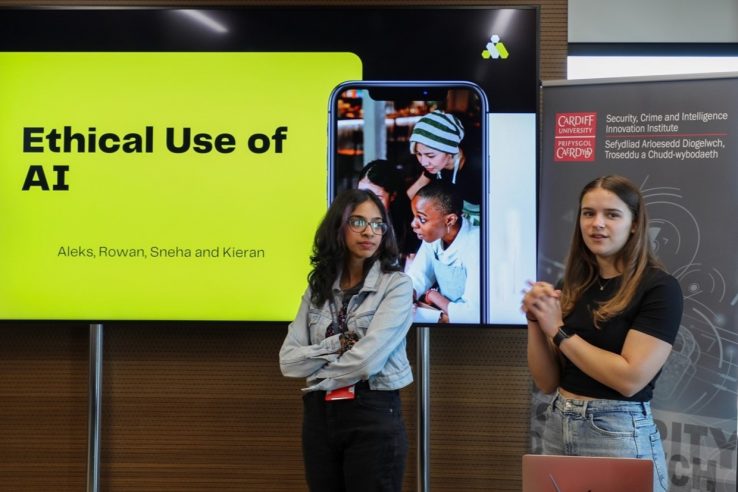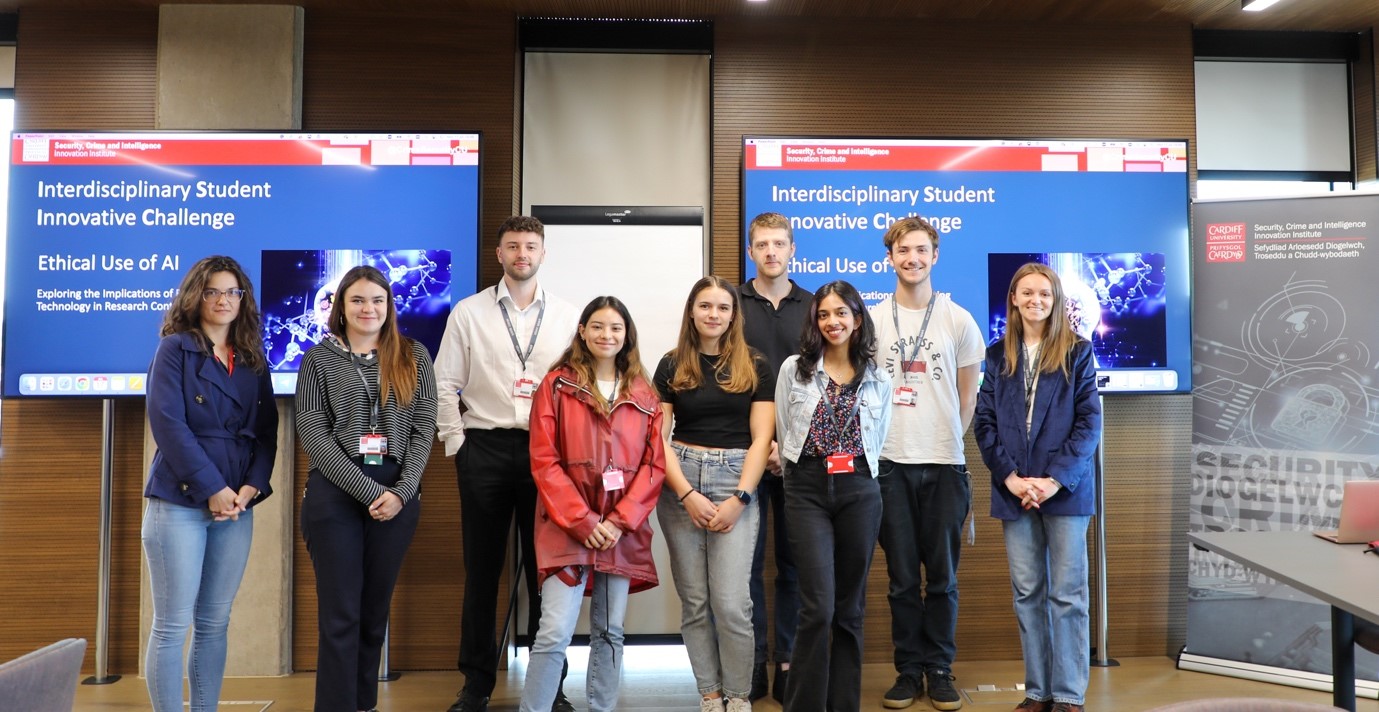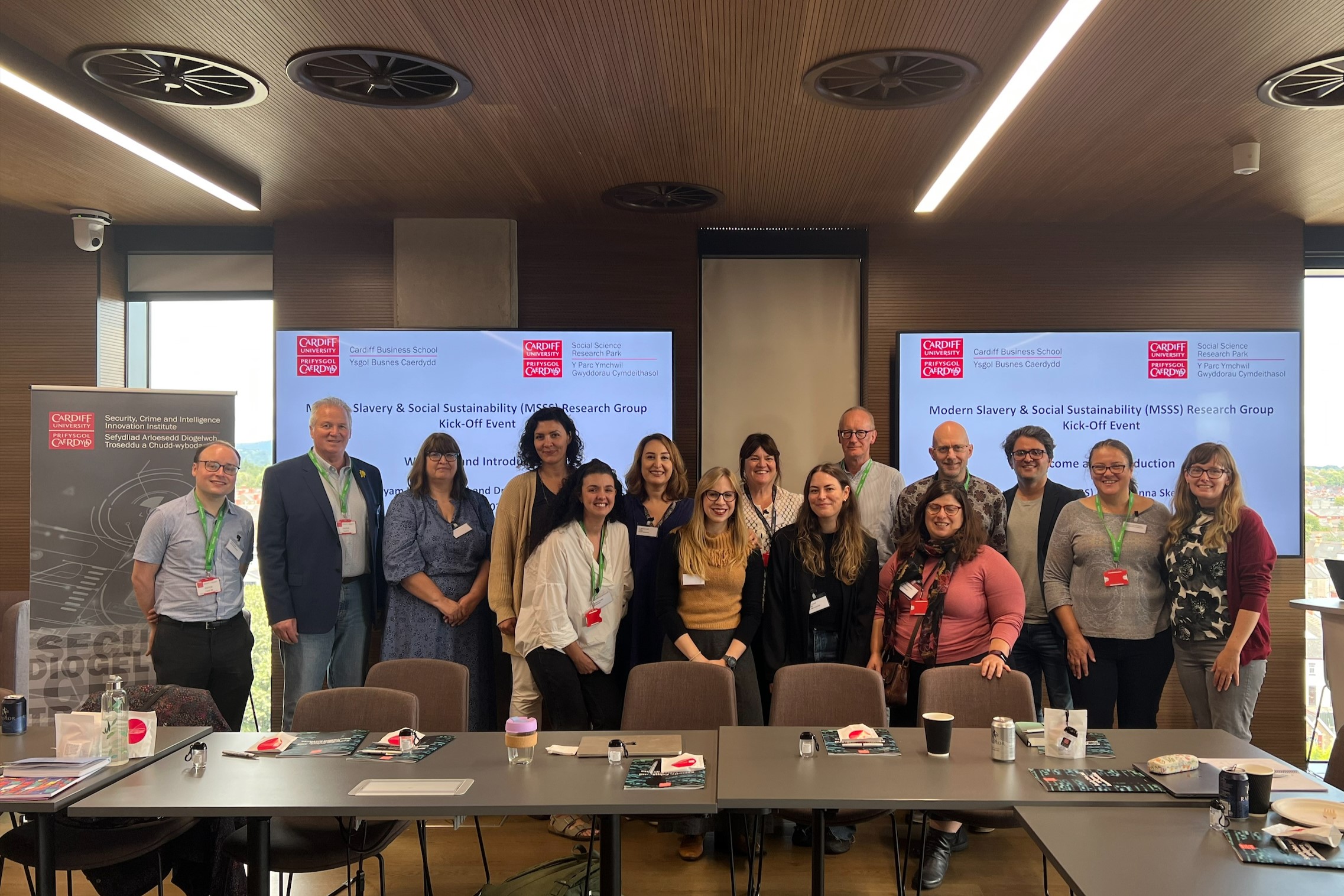Kickstarting innovation in public safety
8 November 2023
Kickstarter funding schemes are a fantastic catalyst for nurturing new research collaborations and initiatives. In this blog we discuss four projects that have benefitted from Kickstarter funding provided by the Security, Crime, and Intelligence Innovation Institute.
Innovative research into security, crime, and intelligence is necessary to build a better future by fostering safer communities, preventing threats, and ensuring a just and secure environment for all. Earlier this year the Security, Crime, and Intelligence Innovation Institute launched their Kickstarter funding scheme to support small-scale research activities related to the areas of crime, policing, violence, defence and national security, and social control. The scheme was open to all Cardiff University members of staff and could be used to fund a range of activities, including (but not limited to) knowledge exchanges via events and workshops, conference attendance where a paper had been accepted, or job-shop costs to fund a student Research Assistant.
Several applications were made, and four proposals were selected to run knowledge exchange events and receive a share of the £40k funding that was available. Below we share some details about each of those projects, their aims, and touch upon the opportunities that the Kickstarter funding fostered.
Interdisciplinary student innovative challenge
Project lead – Viorica Budu, School of Social Sciences

The recent emphasis on using AI within academia has brought attention to the guidelines established by Russell Group universities for the implementation of generative artificial intelligence. However, a notable gap exists within these guidelines, as they primarily concentrate on teaching and learning, without addressing the crucial aspect of integrating AI into research endeavours.
The interdisciplinary student innovative challenge was a half-day session for students on placements with Learning and Teaching Academy On-campus Internships within the Security, Crime, and Intelligence Innovation Institute and DECIPHer, and was aimed at fostering interdisciplinary collaboration through teamwork, while exploring solutions for a research problem. The students worked in groups while being mentored by researchers from the institute. Through team building activities, they were encouraged to think of their group as a research team, to reflect on their research interests, and highlight their strengths and skillset that would help them to solve the given problem. The core activity revolved around the interdisciplinary teams exploring the dimensions of AI ethics and propose a guideline for ethical use of AI in research.
The event acted as a platform for enhancing participants’ grasp of the subject matter. It unveiled previously unexplored facets of AI ethics, enriching participants’ perspectives. Through dynamic and insightful discussions, coupled with exposure to pertinent research papers and resources, attendees immersed themselves in the multifaceted dimensions of ethical considerations tied to AI research. Through brainstorming and creative solution development, this interdisciplinary activity honed the students critical thinking, problem-solving, and teamwork skills, equipping them with practical tools for their future research projects.
Researchers at the institute played a crucial role as mentors throughout the event, offering their expertise and guidance to support the students in navigating the complexities of interdisciplinary problem-solving. Attending the event helped the students obtain transferable soft skills for professional practices in industry and academia, particularly in regards ethical professionalism when handling sensitive and personal data.
Public order policing on camera—the new visibilities of policing-in-action
Project leads – Dr Terry Au Yeung and Dr Robin Smith, School of Social Sciences

In recent times, the visibility of policing activities has been profoundly transformed by the emergence of new visual and social media technologies. Policing is ‘on display’ like never before, with the public having access to events which were traditionally local and involving only the immediate participants. The proliferation of mobile digital technologies in the form of the smartphone have rendered policing encounters a ‘broadcast site’ with a potentially global audience. This has produced new contours of accountability and scrutiny as well as the safeguarding of citizen’s rights. At the same time, the police themselves are also utilising new visual technologies in the form of body-worn and drone-carried cameras.
More than a decade ago, Andrew Goldsmith outlined the profound implications that emerging technologies and the new visibilities they offer could have on police accountability and legitimacy. Since then, both professionals and lay-people have been exploiting the affordances of rapidly developing media technology to visually recreate events, story-tell, or even conduct “explorations” of policing conduct. In comparison, academic attention to, and empirical engagements with, the proliferating, publicly available visibilities and reconstructions has been surprisingly slow to develop.
This lag is being addressed by the recently funded international ESRC ORA7 Visions of Policing project led by Dr Robin Smith and Dr Terry Au Yeung. The project received Kickstarter funding from the Security, Crime, and Intelligence Innovation Institute to enable the hosting of a workshop which brought together researchers working with video materials from policing encounters, as well as international academics from UK, Finland, France, Germany, and the USA, who predominantly work from an ethnomethodological and/or conversation analytic perspective, to explore the affordances and forms of policing visibilities.
The workshop was a combination of paper presentations, data sessions, and methodological discussions. Across the two days it generated a range of insights into public perceptions of reasonable officer conduct, media representations and reconstructions of policing controversies, resistance and non-compliance from citizens, and fine-grained analyses of the escalation and de-escalation of police-citizen violence.
The workshop proved highly successful, achieving its primary goal of establishing a budding network of researchers dedicated to studying the real-world application of ‘policing-in-action.’
Coercive control in healthcare interactions
Project lead – Dr Anna Sydor, School of Healthcare Sciences
In various clinical settings and scenarios, patients are often questioned about domestic abuse, but individuals may be experiencing coercive control without recognising it as abusive. Dr Sydor intends to conduct research to explore how healthcare professionals can assist in identifying unseen and unrecognised coercive control. Initially, she plans to conduct a scoping review to compile information on methods for identifying this form of abuse. Subsequently, empirical research will be conducted with midwives, given that their clinical setting is ideal for investigating their experiences and the potential development of tools or support for identifying coercive control.
Kickstarter funding was sought to facilitate an initial meeting aimed at gathering input from stakeholders and supporting the preparation of a fellowship application to fund the scoping review. The event led to productive discussions with a representative from Women’s Aid and health visitors, which resulted in the opportunity to observe health visiting practices. Dr Sydor has since submitted a fellowship application to Wellbeing of Women and plans to submit another in the upcoming call for the Health and Care Research Wales Advanced Fellowship Award. The process of applying for funding also facilitated valuable connections with academics from other institutions and boosted Dr Sydor’s confidence in discussing her research ideas.
Modern slavery and social sustainability
Project leads – Dr Maryam Lotfi, Cardiff Business School, and Dr Anna Skeels, sbarc|spark

sustainability event
Modern slavery exists all around us, and very often in plain sight. To help combat this, Cardiff University has established a new research collaboration through the Modern Slavery and Social Sustainability Research Group, the first of its kind in Wales and the UK.
This new initiative connects closely with the Security, Crime, and Intelligence Innovation Institute’s substantive research focus on crime, violence, and policing, particularly in the areas of detecting, preventing, and responding to modern slavery in the form of child slavery, child sexual and child criminal exploitation, human trafficking, forced labour and domestic servitude, and modern slavery risk management and supply chains.
The Kickstarter funding supported an inaugural multi-agency, multi-disciplinary kick-off event for the research group. During the well-received event, researchers and external partners came together to learn about the group and discuss research on supply chain modern slavery risk management and people with lived experience of modern slavery. Attendees included representatives from across Cardiff University, other universities in the UK, and partners such as the Welsh Government, Unseen UK, Cardiff Council and Barnardo’s.
The funding also enabled two related knowledge exchange visits for Dr Anna Skeels, bringing academics from other UK universities into the group from Aberystwyth, Sheffield Hallam, and Portsmouth universities, as well as connecting with practitioners working to prevent child modern slavery in England and Wales.
In addition to funding the first multi-disciplinary event focused on modern slavery and social sustainability held at Cardiff University, the Kickstarter funding helped to build formative relationships between two previously distinct academic communities: those focusing on supply chains and those focusing on survivors; two fields that need to interconnect. It has also enabled the beginnings of a collaborative programme of activity through the new research group as well as an in-person base for future responsive working on research projects and funding proposals.
To learn more about the work of the Security, Crime, and Intelligence Innovation Institute visit their website or follow them on social media. If you’d like to learn more about any future funding opportunities available from the institute, contact Elise Barker – barkere5@cardiff.ac.uk